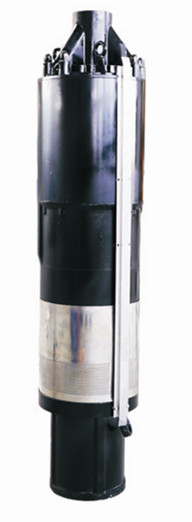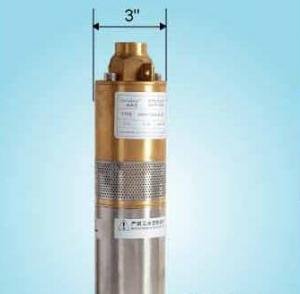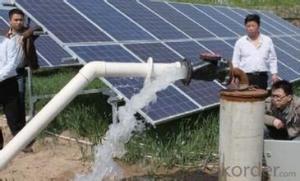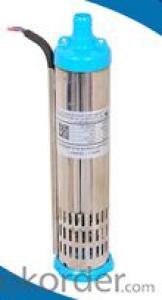Solar Pump Company Solar Water Pump 3ds-14
- Loading Port:
- China Main Port
- Payment Terms:
- TT OR LC
- Min Order Qty:
- -
- Supply Capability:
- 300 sets /month
OKorder Service Pledge
OKorder Financial Service
You Might Also Like
Product description:
Product: Solar water pump
Model:3DS-14
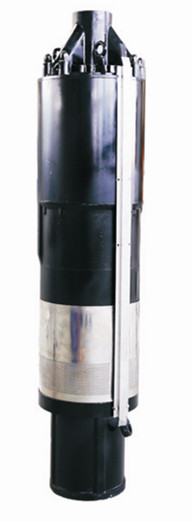
Appilication:
submersible pump
for deep well or pond or lake
for irrigation of a big farm with 12000 m2
Product specification:
flow rate:20m3/ hour, 160m3/day.
lift: 10m-50m
pump diameter: 296mm
well diameter more than 310mm
with BLDC motor, motor power:4000W
but only need solar power:2200W, our pump can save more than 50% solar panel power.
Material:
Pump inside: stainless steel and wearable nylon,it enables our solar pump to have 10 years sevice life.
Motor length:30cm,80% shorter than other motors. So that you can pump 80% more water by our solar pump.
Certification:
3 International patent
ISO9001
CE
Warranty:2 years
- Q: Can solar pumps be used for water supply in refugee camps or temporary settlements?
- Yes, solar pumps can be effectively used for water supply in refugee camps or temporary settlements. Solar pumps are an ideal solution as they are environmentally friendly, cost-effective, and can operate in remote areas without access to electricity. They provide a sustainable and reliable source of water for drinking, sanitation, and other essential needs in these temporary settings.
- Q: How does the size of the solar pump controller affect its performance?
- The size of a solar pump controller can have a significant impact on its performance. The size refers to the capacity or power output of the controller, which is usually measured in watts. A larger solar pump controller with a higher power output can handle larger loads and can therefore support more powerful pumps. This means that a larger controller can handle higher flow rates and lift heights, allowing for more efficient water pumping. It can also support larger solar panels, which can generate more electricity and recharge the batteries faster. On the other hand, a smaller solar pump controller with a lower power output may not be able to handle high flow rates or lift heights. It may struggle to power larger pumps, leading to reduced performance and efficiency. Additionally, a smaller controller may have limited compatibility with solar panels, resulting in slower battery charging and reduced overall performance. Therefore, choosing the right size solar pump controller is crucial to ensure optimal performance. It is important to consider the required flow rate, lift height, and the power requirements of the pump. By selecting a controller with a suitable size, one can maximize the efficiency and effectiveness of the solar pumping system.
- Q: What is the maximum depth a solar pump can lift water from?
- The maximum depth a solar pump can typically lift water from depends on the specific model and its power output. However, in general, solar pumps can lift water from depths ranging from 20 to 200 meters, with some specialized models capable of reaching even greater depths.
- Q: Are there any restrictions on using a solar pump in agriculture?
- Yes, there can be certain restrictions on using a solar pump in agriculture. Some potential limitations include the availability of sunlight, which can affect the efficiency of the pump, especially in regions with frequent cloudy or rainy weather. Additionally, the initial cost of installing a solar pump can be higher compared to traditional pumps, which may pose financial constraints for some farmers. It is also important to consider the size and capacity of the solar pump, as it may not be suitable for large-scale irrigation needs.
- Q: Can a solar pump be used in conjunction with a water storage system?
- Yes, a solar pump can be used in conjunction with a water storage system. Solar pumps use energy from the sun to pump water, and they can be connected to a water storage tank or reservoir to store the pumped water for later use. This combination allows for a sustainable and efficient water supply system, especially in areas where access to electricity or traditional water sources may be limited.
- Q: Can solar pumps be used for dewatering or flood control?
- Yes, solar pumps can be used for dewatering or flood control. These pumps utilize solar energy to power their operation, making them an environmentally friendly option for managing water levels during dewatering or flood situations. They can be used to drain water from flooded areas or control water levels in ditches, ponds, or other water bodies, providing an effective and sustainable solution for flood control and dewatering purposes.
- Q: Can a solar pump be used in commercial agriculture?
- Yes, a solar pump can be used in commercial agriculture. Solar pumps are an environmentally-friendly and cost-effective solution for irrigation in agricultural fields. They use solar energy to power the pump, eliminating the need for electricity or fuel. This makes them particularly suitable for remote areas where grid electricity is not available or unreliable. Solar pumps have several advantages for commercial agriculture. They can provide a consistent and reliable water supply for irrigation, which is essential for crop growth and yield. They can also be easily scalable to meet the water demand of large agricultural operations. Moreover, solar pumps have low operational and maintenance costs compared to conventional pumps. Once installed, they require minimal maintenance and have a long lifespan. This makes them a cost-effective option for commercial farmers, reducing their dependency on expensive diesel or electric pumps. Additionally, using solar pumps in commercial agriculture can have positive environmental impacts. By harnessing solar energy, they reduce greenhouse gas emissions and contribute to sustainable farming practices. This aligns with the growing global trend towards more sustainable and eco-friendly agricultural practices. In conclusion, solar pumps can indeed be used in commercial agriculture. They offer a reliable, cost-effective, and environmentally-friendly solution for irrigation in agricultural fields, making them a viable option for commercial farmers.
- Q: How to use solar panels to drive 50W of circulating water pump, what configuration needs, how to connect?
- But you may have doubts, the current is big, the opportunity will not be easy to burn out, I give an example: the battery current is like the car's seat, people metaphor for the load, the motor rated power unchanged
- Q: Can solar pumps be used for water supply in recreational facilities or parks?
- Yes, solar pumps can be effectively used for water supply in recreational facilities or parks. Solar pumps are a sustainable and environmentally friendly solution that utilize energy from the sun to power water pumping systems. They can efficiently provide water for various purposes such as irrigation, fountains, or even drinking water supply in these recreational areas. Solar pumps offer a cost-effective and reliable alternative to traditional electricity-dependent pumps, making them an ideal choice for water supply in parks and recreational facilities.
- Q: Can a solar pump be used in saltwater or corrosive environments?
- Yes, solar pumps can be used in saltwater or corrosive environments. They are typically made with materials that are resistant to corrosion, such as stainless steel or high-quality plastics. This allows them to withstand the harsh conditions and continue functioning effectively, making them suitable for use in such environments.
Send your message to us
Solar Pump Company Solar Water Pump 3ds-14
- Loading Port:
- China Main Port
- Payment Terms:
- TT OR LC
- Min Order Qty:
- -
- Supply Capability:
- 300 sets /month
OKorder Service Pledge
OKorder Financial Service
Similar products
Hot products
Hot Searches
Related keywords

